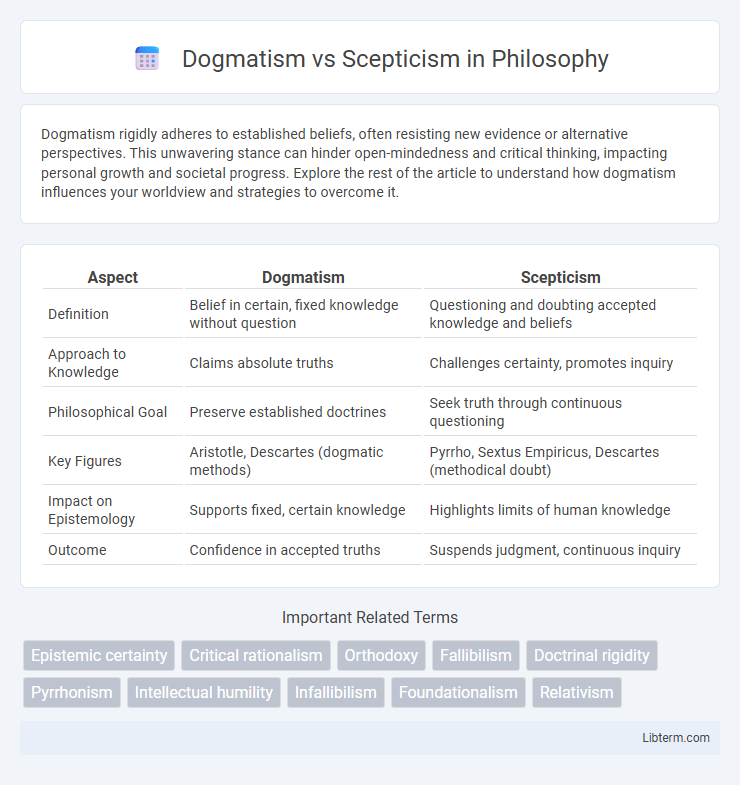Dogmatism rigidly adheres to established beliefs, often resisting new evidence or alternative perspectives. This unwavering stance can hinder open-mindedness and critical thinking, impacting personal growth and societal progress. Explore the rest of the article to understand how dogmatism influences your worldview and strategies to overcome it.
Table of Comparison
| Aspect | Dogmatism | Scepticism |
|---|---|---|
| Definition | Belief in certain, fixed knowledge without question | Questioning and doubting accepted knowledge and beliefs |
| Approach to Knowledge | Claims absolute truths | Challenges certainty, promotes inquiry |
| Philosophical Goal | Preserve established doctrines | Seek truth through continuous questioning |
| Key Figures | Aristotle, Descartes (dogmatic methods) | Pyrrho, Sextus Empiricus, Descartes (methodical doubt) |
| Impact on Epistemology | Supports fixed, certain knowledge | Highlights limits of human knowledge |
| Outcome | Confidence in accepted truths | Suspends judgment, continuous inquiry |
Introduction to Dogmatism and Scepticism
Dogmatism asserts the certainty of knowledge without requiring evidence, relying on fixed beliefs that resist challenge or revision. Scepticism promotes continuous questioning and doubt, emphasizing the need for evidence and critical inquiry before accepting claims as true. This contrast highlights fundamental differences in epistemology, where dogmatism seeks absolute certainty and scepticism prioritizes inquiry and open-mindedness.
Defining Dogmatism
Dogmatism refers to the unwavering adherence to certain beliefs or doctrines, often without consideration of evidence or alternative viewpoints. It involves asserting opinions as incontrovertible truths, which can hinder open-minded inquiry and critical thinking. This rigid stance contrasts with scepticism's emphasis on questioning and evaluating claims based on evidence.
Understanding Scepticism
Scepticism challenges dogmatism by questioning the certainty of knowledge claims, emphasizing doubt and critical inquiry. It advocates for continuous examination of evidence and refrains from accepting beliefs without sufficient justification. This approach fosters intellectual humility and promotes open-mindedness in the pursuit of truth.
Historical Roots and Evolution
Dogmatism, rooted in ancient Greek philosophy, emphasizes unwavering adherence to established beliefs, prominently reflected in the doctrines of Plato and Aristotle. Scepticism, originating with Pyrrho and later developed by Sextus Empiricus, challenges the possibility of certain knowledge by advocating for continual questioning and suspension of judgment. Over centuries, these opposing perspectives evolved through the Enlightenment and modern epistemology, shaping contemporary debates on knowledge, belief, and scientific inquiry.
Key Philosophical Differences
Dogmatism asserts that certain knowledge or beliefs are unquestionably true, often relying on established doctrines or authoritative sources without room for doubt. Scepticism challenges the possibility of absolute knowledge, emphasizing continuous questioning and critical examination of beliefs to avoid unwarranted certainty. Key philosophical differences revolve around the acceptance of truth claims, where dogmatism accepts them as certain, and scepticism maintains a position of doubt and ongoing inquiry.
Dogmatism vs Scepticism in Science
Dogmatism in science refers to the rigid adherence to established theories and beliefs, often resisting new evidence or alternative viewpoints. Scepticism, in contrast, encourages continuous questioning and critical examination of scientific claims, fostering an environment where hypotheses are rigorously tested and validated. The dynamic tension between dogmatism and scepticism drives scientific progress by balancing stability with innovation in knowledge development.
Impacts on Society and Culture
Dogmatism often stifles social progress by promoting rigid beliefs that resist change, leading to cultural stagnation and reduced intellectual diversity. Scepticism encourages critical thinking and open dialogue, fostering innovation and adaptive societal values. Societies embracing scepticism typically experience enhanced creativity, tolerance, and democratic engagement compared to dogmatic counterparts.
Strengths and Weaknesses of Each Approach
Dogmatism offers strength in providing firm, consistent beliefs that foster stability and decisiveness, yet its rigidity can hinder adaptability and critical evaluation. Scepticism excels in promoting open-minded inquiry and preventing premature conclusions, but excessive doubt may lead to indecisiveness and hinder knowledge acquisition. Balancing dogmatic certainty with sceptical scrutiny enhances comprehensive understanding and rational judgment.
Modern-Day Examples and Applications
In modern-day science, dogmatism often manifests in rigid adherence to established paradigms despite emerging evidence, while scepticism drives critical inquiry and continuous reevaluation of hypotheses, exemplified by debates over climate change data interpretation. In politics, dogmatism appears in unwavering support for partisan ideologies, whereas scepticism fosters open dialogue and challenges to consensus, seen in public discourse on immigration policies. Technology adoption also reflects this tension; AI integration faces dogmatic resistance from those fearing change versus sceptics advocating cautious, evidence-based deployment.
Striking a Balance: Navigating Between Extremes
Striking a balance between dogmatism and scepticism requires embracing open-minded inquiry while maintaining critical standards of evidence. Dogmatism often leads to rigid, unchallenged beliefs, whereas scepticism champions doubt but risks paralysis through excessive questioning. Navigating between extremes fosters intellectual humility and adaptability, promoting well-founded convictions that remain open to revision.
Dogmatism Infographic

 libterm.com
libterm.com